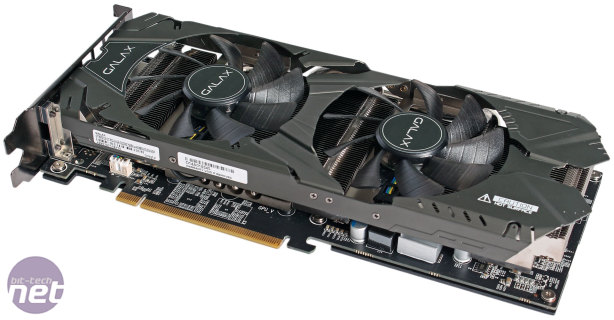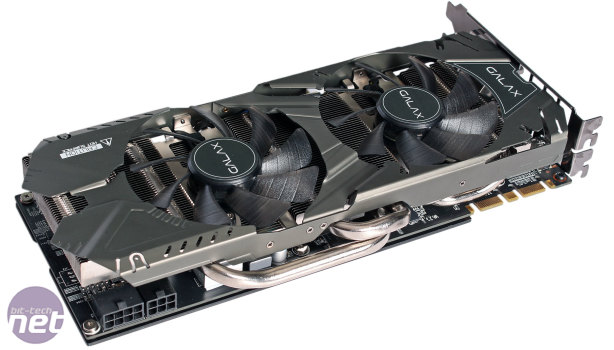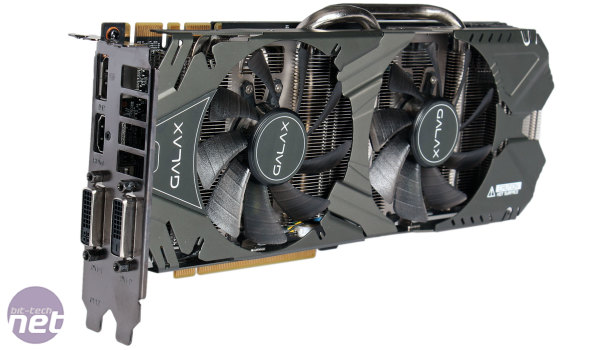
Performance Analysis
While the clock speeds of the GTX 970 EXOC Black Edition are the same as we saw on the EVGA GTX 970 SC ACX2, the Galax card actually boosts higher under load (around 1,375MHz compared to about 1,315MHz), so it's typically a little faster in the benchmarks, though rarely by any perceptible difference. For example, in Battlefield 4 at 2,560 x 1,440 its minimum frame rate is the same as the EVGA card and just below the R9 290X, but on average it's faster than both. It's similar at 4K, where despite the overclock the card still isn't able to maintain 30fps, though even the GTX 980 isn't able to do this.In BioShock Infinite at 1440p, the Galax card's minimum is actually 3fps quicker than the EVGA, but they have the same average, and al GTX 970 cards so far are comfortably above 60fps minimums here anyway. The 2fps advantage is slightly more significant at 4K, as we're in 30fps territory here, although you'd still be hard pressed to notice it. In this game, the GTX 780 Ti, Titan Black and GTX 980 are all marginally faster, but the Galax card is way ahead of an AMD R9 290X.
In Crysis 3, the card just manages to surpass the R9 290X and EVGA GTX 970 on the average frame rate, but the all-important minmum remains the same at 36fps for 1440p – the GTX 980 has a clearer lead here. It's 1fps faster than any other GTX 970 at 4K, but this is meaningless since it's unplayable anyway.
Skyrim is of course no trouble at all, and the gains are again small. At 4K, the GTX 970 is oddly only on par with the R9 290. We're not sure why, but with a 50fps minimum it's still smooth.
The Galax card is again the fastest GTX 970 in Unigine, both at 1080p and 1440p, where it has a lead on the slowest card we've seen (the Asus Strix) by 7 and 8 percent respectively. Furthermore, it closes the gap on the GTX 980 even more such that the flagship card is only ahead by between 6 and 8 percent – not a lot considering the wide price gap between them. The Galax card is also way ahead of any AMD competition, but this is usually the case for Nvidia GPUs in this benchmark.
Power consumption is where you'd expect i.e. higher than any other GTX 970 so far. This is because it has a 6-pin/8-pin PCI-E power plugs and the highest clock speeds. The Asus Strix GTX 970 has lower speeds and a single 8-pin plug and consumes almost 50W less. The system power consumption of 326W when using the Galax card is still below that of a GTX 770, so it's clearly still efficient, just not as much as other offerings.
The cooler has quite an aggressive fan curve, which helps to keep temperatures way down and clock speeds up. At stock speeds, the fans reached 77 percent speed (approximately 2,350 RPM) under sustained load, which was a little loud relative to the MSI and Asus models in particular. However, these are particularly quiet cards; you'll hear airflow from the Galax card but it's still very quiet compared to the likes of a stock R9 290X, for example. It's also undeniably effective, offering the lowest delta T for a GTX 970 yet of just 40°C. Clearly, if you want to limit your fan speed there's headroom to do so.
The overclocking results are obviously very pleasing, though of course mileage will vary between samples. We see improvements of between 8 and 14 percent in our trio of 1440p benchmarks. Overclocked, the Galax GTX 970 EXOC Black also surpasses every other overclocked GTX 970 and every other stock speed single GPU card too, including the GTX 980. Admittedly, the minimum in Crysis 3 isn't the quickest, but on average it's the fastest. It's hard to argue with results like these in a £260 card. The card became a touch louder, reaching 80 percent fan speed (~2,400 RPM) and hotter by about 5°C, while total power consumption rose to 349W.
Conclusion
The GTX 970 is a fantastic card in general, and you're spoilt for choice by Nvidia's board partners. For its part, the Galax GTX 970 EXOC Black Edition does very little wrong. The cooler could certainly be quieter, but there's no denying that the performance on offer here is fantastic for the price. It's cheaper than the majority of custom cooled R9 290X cards (the stock cooler isn't really an option for this series) and the premium over a R9 290 is generally justified too. Admittedly, EVGA's card is clocked the same and costs £8 less, but the Galax runs cooler, boosts higher and is a better overclocker too, at least in our experience.All told, the MSI GTX 970 Gaming 4G is still our favourite so far. It's a tad more expensive, but it's even better built, almost as fast and is equipped with a quieter, semi-passive cooler, which really showcases what Maxwell is all about: efficiency. Nonetheless, this Galax offering is an excellent and highly recommended alternative if the MSI card is too big for your build or you just want high clock speeds for as little cash as possible.
UPDATE: The price of the Galax GTX 970 EXOC Black Edition has increased from £259.99 at the time of review to £281.99 now. That'll teach us to review things around Black Friday and Cyber Monday (and makes us hate those days even more). Anyway, the price of other cards relevant to this review have generally increased by similar amounts too, and as such we're leaving the review and scores as is.

-
Performance38 / 40
-
Features25 / 30
-
Value27 / 30


MSI MPG Velox 100R Chassis Review
October 14 2021 | 15:04











Want to comment? Please log in.